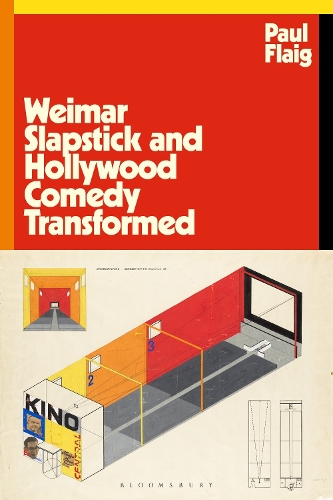
Weimar Slapstick and Hollywood Comedy Transformed
(Hardback)
Publishing Details
Weimar Slapstick and Hollywood Comedy Transformed
By (Author) Paul Flaig
Bloomsbury Publishing PLC
Bloomsbury Academic
2nd October 2025
United Kingdom
Classifications
Tertiary Education
Non Fiction
Performing arts genres: Comedy and humour
Physical Properties
Hardback
304
Width 158mm, Height 236mm, Spine 20mm
621g
Description
Bridging two crucial sites of global, interwar modernity, Hollywood and Weimar Slapstick provides a fundamental reassessment of Weimar culture, Hollywood comedy and their respective, intertwined legacies.
Paul Flaig reexamines a wide range of comedy films featuring and directed by figures including Charlie Chaplin, Buster Keaton, Harold Lloyd, Mickey Mouse, Felix the Cat, the Marx Brothers, and Frank Capra in light of their circulation and citation among German filmmakers, philosophers, advertisers, politicians, artists, playwrights and poets. Drawing on a diverse range of German-language sources, including avant-garde manifestoes, arts journals, feuilletons, trade press reports and academic studies, Flaig investigates the historical context, intellectual foundations, and cultural and political underpinnings that contributed to the fascination with American comic cinema in Weimar Germany. In doing so, he highlights the invaluable insights and imagery of American-obsessed German thinkers and artists, such as Hannah Arendt, George Grosz, and Theodor Adorno, who played a pivotal role in shaping the perception and exploration of slapstick's entanglement with modernity.
Highlighting the captivating powers of slapstick, cartoon, and screwball comedies, Hollywood and Weimar Slapstick offers an alternative history and analysis of European and American film cultures, revealing the cultural exchange and impact of comedy in this pivotal period.
Reviews
A masterful study of Weimar cultures engagement with American slapstick, Paul Flaigs book uncovers forgotten historiesBerthold Brecht on Charlie Chaplin, Walter Benjamin on Frank Capra, Germanys lost Laurel and Hardyrestoring the intellectual and historical contexts that shaped this transatlantic comic dialogue. A genuinely revelatory work. * Robert J. King, Columbia University, USA *
In this brilliant book, Paul Flaig shows how the familiar characters of American slapstick (Chaplin, Keaton, Lloyd, Mickey) assumed new meanings within the crisis-laden context of the Weimar Republic. Both film history and intellectual history, Weimar Slapstick covers an astonishing range of contexts, from philosophy to the Bauhaus to advertising film. -- Michael Cowan, The University of Iowa, USA
Weimar Slapstick provides a welcome deep-dive into the influence of American slapstick on Weimar and post-Weimar German cultural practice and theory. It is an invaluable resource for scholars in transnational media studies and will remain essential reading for those interested in U.S.-German cultural relations for years to come. -- Ervin Malakaj, University of British Columbia, Canada
Author Bio
Paul Flaig is Lecturer in Film Studies at the University of St. Andrews, UK. He is the co-editor of New Silent Cinema (2015) and his writing has appeared in Journal of Cinema & Media Studies, Camera Obscura: Feminism, Culture, and Media Studies, and Screen.
